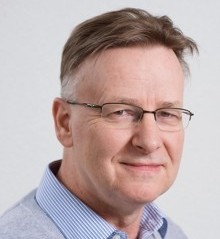Werner Müller is the current Bill Ford Chair of Cellular Immunology at the University of Manchester, and currently is also the research theme director of Infection, Inflammation Immunity in the faculty of life sciences.
Can you summarise your career path?
I studied Biology with a focus on Genetics at the University of Cologne, did my PhD in the lab of Prof. Klaus Rajewsky and stayed in the lab until 2000, when the lab was dissolved. I then started a new department of Experimental Immunology at the Helmholtz Centre of Infection Research in Braunschweig, and in 2006 moved to the University of Manchester. My main focus is to develop animal models for human diseases.
Where do your best ideas emerge from?
I like to interact with scientist from as many disciplines as possible and from these interactions and learning experiences new ideas in my research area evolve.
Who or what had or has had the strongest positive influence on your career and work?
My current approach to science was clearly formed in the lab of Klaus Rajewsky, characterised by critical assessment of experimental results, constant optimization and innovations of methods applied and trying to chase important questions.
What do you consider the greatest challenge or hurdle for progress in your field?
In basic research we have many experts focused on selective aspects of questions in biology and life sciences. In medical research we have experts in certain disciplines. It is very difficult to get to a big picture. Not only the focused expertise but also the complex, fast evolving methods, while enhancing the production of valuable data, make it difficult to get a comprehensive big view, easy to understand but complex within.
What are, in your opinion, the opportunities, directions or decisions that are vital to progress systems medicine?
We have to overcome the disease focused approach in medicine and get a more comprehensive view for an individual person and based on this view, try to prevent and/or to treat disease in the best possible way targeted for a given patient. We have to be able as much as possible to utilize “big data” from patient cohorts to learn from experience, and from system approaches build on top of “big data”. For this we need new ethical frameworks harmonized across Europe with strong protection of the individual personal data.
Tell us what would have to happen in your work for you to say “A dream has come true!”?
Driven by the phenotype of one of the many animal models developed so far, we now know that one cytokine, Interleukin-10, is key for the control of the gut immune system. Lack of this cytokine leads to chronic inflammatory bowel disease. A dream would come true if we would be able to restore the control of the gut immune system of patients with chronic inflammatory bowel disease by restoring local immune control, may be through intelligent ways to provide Interleukin-10 in the correct form at the correct time in the correct space. Our EU consortium SysmedIBD is one step toward this goal.
If you could not be a scientist, what would you like to be?
I would like to work as a stage director for plays from German playwriters translated to English with a team of experienced actors and tour through the UK.
What was your greatest experience as a scientist?
May be, when I met Christoph Klein in Hannover and he told me about a group of patients that had mutations in the Interleukin-10 receptor gene and developed early onset inflammatory bowel disease.
With which historical person, politicians or celebrity would you like to have a dinner and discuss your work?
As a PhD student I listened to a talk of Charles Janeway. He discussed functions of the immune systems with an evolutionary perspective and suggested for example that molecules between insects and mammals are shared within the innate immune system leading to the discovery of the toll like receptors.
Would you be happy to share something about your private life and activities in your spare time?
When I studied Biology at the University of Cologne, I was introduced to the local bird populations in the city of Cologne. Over time, I have more and more developed skills to be a bird “listener” and to be a bird watcher. Birdwatchers claim that in the area, where I now live, 110 species of birds can be found. May be, one day I will be able to claim that I have observed all of these 110 species but I am not taking this too serious.
